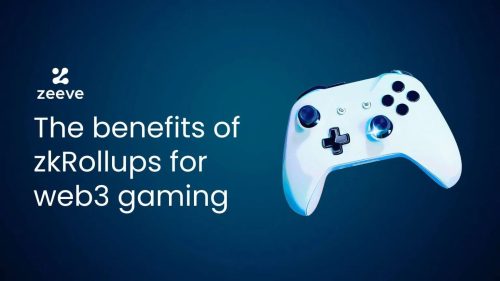
Diving deep into the benefits of ZK Rollups for Web3 Gaming
If you are closely following the developments of the zkRollup space for the last couple of months, you must have seen the number of games either launched or migrated to the zkRollup chains. zkRollups is coming out as one of the biggest applications for the gaming industry because of some of its inherent properties.
In this article, we will dive deep into what are ZK Rollups, and what benefits they bring to web3 gaming.
What Are Zero-Knowledge Rollups?
A ZK-Rollups is a scaling solution for L1s that uses a cryptography primitive known as ZKPs or Zero-Knowledge Proofs to shorten the data posted on L1 to validate a transaction.
In this way, they reduce the proof size of the transactions from KBs to bytes, freeing up the space to accommodate massive scaling requirements of applications requiring decentralization, transparency, privacy, security, and scalability to occur simultaneously. Hence, you can say that roll-ups will supercharge the Web 3 gaming environment where gamers and developers will not have to succumb to blockchain trilemma and suffer at the hands of the UX.
Read more on zkRollups: How do you scale your dApp with the power of zkRollups?
Why Web 3 Gaming Needs Zk-Rollups

Let’s break down the benefits of Zk-Rollups for web3 gaming
Customizing the GamePlay
Developers want full modularity while developing the Web 3 games, which they cannot get while developing on top of a monolithic L1 blockchain. For example, it might be the case that the game doesn’t need all the game mechanics functions to happen on-chain, or there might be the case that the developers are not too keen to use smart contracts. ZK-rollups provide them with an edge where they can launch the games and their mechanics on their own server while using the L1 blockchains for security to trigger minting and trading NFTs and ensuring that ownership stays with players while paying little or no fees for such services.
Scaling the Web 3 Games
When you want to sustain an entire gaming ecosystem, the technology stack should be such that no matter whether your platform experiences a few thousand or near-infinite network activity in millions or billions, your gameplay shouldn’t suffer. With zk-roll-ups, it is possible to off-load a large part of the transactions and create cryptographic proofs against the same, which minimizes the transaction sizes from KBs to Bytes.
In this way, they free up the space and significantly reduce the gas costs. In some cases, the gas costs can be reduced to 0 as well. Hence, it allows the Web 3 games to scale linearly as per the platform requirements. The key trade-off is that Zk-rollups do all that without facing the blockchain trilemma challenge.
Protecting Autonomy
Most game developers/ studios were not keen to join the Web 3 gaming landscape because absolute decentralization can dilute their stakes in the game. With the help of Zk roll-up solutions, game developers can designate specific rules and regulations independent of the network that support the security of the rollups.
Immutable ZkEVM allows developers to move their smart contracts from the base L1 chain to the rollup chains and designate their own rules to benefit them economically. In this way, game developers can safeguard their own interests in the form of defining rules for economic incentivization, like taking a share of the fees and royalties that would happen in a separate off-chain environment or defining their own sequencer sets to collect the fees. At the same time, they inherit the security of the L1 to safeguard the ecosystem. For composability, the developers can use other roll-up ecosystems like StarkNet or StarkX as a rollup environment to not compromise on liquidity.
Hence, it can help in building a sustainable, robust, and decentralized gaming environment where every respective stakeholder benefits in one way or the other. Game developers have control over the game economy and revenue generation;. At the same time, the players can enjoy superior gameplay and UX because of the use of rollups that significantly cut down the transaction cost while allowing the gamers to enjoy ownership, transparency, and interoperability with other game environments without compromising security and privacy.
Simplifying Game Development
While developing a game, the focus of the developer should be to improve the gameplay and user experience. But when it comes to Web 3 games, the learning curve is so vast that developers have to search for resources that can help them install the tools that are required for building Web 3 games. It amounts to understanding and setting up the blockchain RPC and indexing data, specifying the consensus, and other things that should fit in according to the base layer that will be used for security.
With so much at hand, it essentially leads to compromising the game play because they have to think about other things instead of the game environment. Zk-Rollups provides modularity where the developers have the flexibility to deploy custom, composable smart contracts. With this trade-off, games can even enjoy an L3 approach to building their applications as per their user base. To put that into perspective, if the game has more than 10 million active users and demands very high throughput.
In such a situation, they get the leverage of using both the security of the Base Layer while not having to be bothered about sharing the space with noisy neighbors because zk-Rollups will help them launch as standalone apps as well.
That’s what Starknet, in conjunction with Immutable X, promises developers. In addition to this, the developers will also have the leverage to use superior execution engines available for their Dapps without affecting the other components of the ZK rollups. Hence supercharging the gaming ecosystem because L1 Web 3 games can migrate to the ZK Rollup ecosystem without a fuss.
Smoothing Asset Withdrawal
Asset withdrawal is a key challenge while using optimistic rollups for gaming. That’s why Zk Rollups are often labeled as a golden standard in gaming. Since instead of using validity proofs, they use fraud proofs, it streamlines instant finality and withdrawal of their NFTs immediately post the purchase. Thereafter, they can also use the NFT to interact with other gaming environments.
Building A Multiple Roll-up Ecosystem
At the moment, Web 3 gaming is suffering primarily because the existing blockchain stacks are like separate Islands having their own rules and regulations to satisfy communication. With the help of a native Zk-Rollup approach, which is in progress, a 3-layered scalability architecture can be engineered. In this architecture, the 3rd layer will be a friendly rollup chain using the Zk-composable stack. They would appear somewhat like this:
As you can see, they appear much like the Polkadot ecosystem; however, they will be chosen in place of Polkadot because the consensus of the para chains depends on a set validator node. Contradicting this with the Zk-Rollups, they will have the advantage of collecting data from all native roll-up solutions in L3, and in the process, they verify all the ZK-proofs to change the state of the roll-up. In this way, it becomes very easy to build a common roll-up ecosystem for all the dapps developed on top of a ZK RollUps solution to scale Web 3 gaming.
Top Games Migrating or Launched on zkRollups
Gods Unchained
God’s unchained witnessed a massive spurt since their launch. For example, in the last 3 years, the game has exchanged over 53 million NFT Cards. However, one of the key challenges that the game faced was providing true value to NFTs minted within its ecosystem of any proportion. To help mitigate the same, Gods Unchained used Immutable X powered by Polygon CDK Zk-Rollup solution that allowed the game to mint over 100 million cards at no cost. With that said, even the least expensive NFTs of Gods Unchained have a value attached, and they pull gamers into their ecosystem. Allegiance to Zk-Rollups, which have made minting NFTs simpler.
Magic Eden
The objective of Magic Eden was to provide specific tools required for creators to build the next gen gaming environment. Through the use of Polygon CDK, Magic Eden would be leveraging cross chain functionality and interoperability to reach a wider audience base. Polygon CDK has guaranteed that by allowing the games to interact with multiple other games built using the Polygon CDK.
FootEarn
FootEarn wanted to make the eSport gaming reach to the next level and for that reason, they needed a technology stack that could help them scale during peak hours with zero fees. Polygon CDK has provided them with such a trade-off where they can optimize the gas fees so that users can easily participate in the esports games.
Other Games Using Zk-Rollups
- Sailwars
- Shardbound,
- SimWin Sports,
- Space Nation,
- S369,
- Moongaming,
- Sandbox,
- Eyeball Games,
- Magmabyte,
Launching a custom gaming ZkRollup using Zeeve RaaS
Zeeve is a Rollups-as-a-service(RaaS) platform providing access to the widely used ZK Rollup SDKs. We support Polygon CDK and ZK Stack. Developers and game studios can build scalable, zero-knowledge powered L2/L3 chains using both the SDKs.For Polygon CDK, it could be a L2 chain using Ethereum as base or an L3 chain using Polygon zkEVM as base chain. We have 1-click Polygon CDK Sandbox as well, where you can run a DevNet, deploy dApps as many times as you can and find the best suitable configurations before you move to testnet/mainnet. For zkStack also, you can use Zeeve to create Hyperchains (L3s) using zkSync Era as base. You can connect to Ethereum as well though.
With support from Zeeve integration partners, our RaaS platform offers you complete modularity to choose your Data Availability solution, types of sequencers, Account abstraction SDKs, decentralied oracles, interoperability layers etc.
If you are not sure about what solution might be the best fit for your application, get in touch with our Zeeve experts. Schedule a call today, or drop us a message.



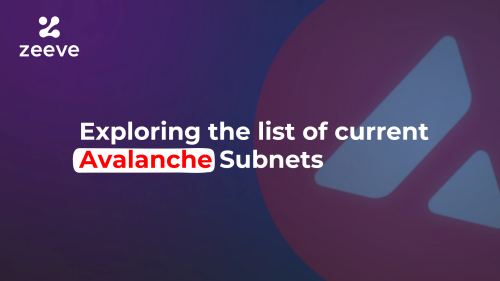
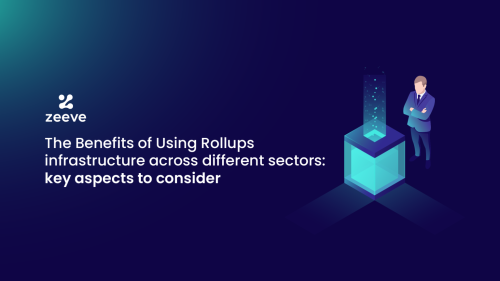
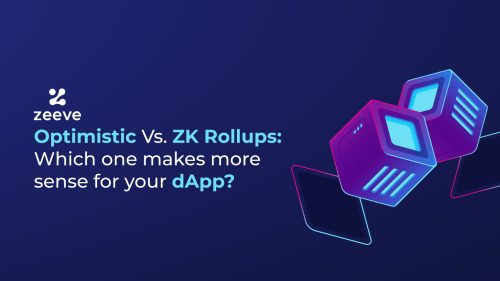
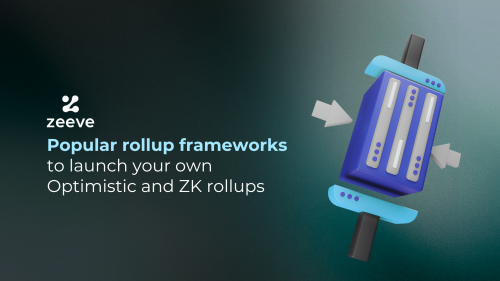
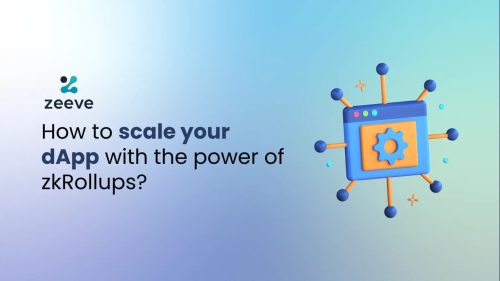
Responses